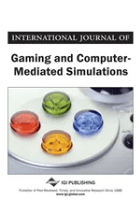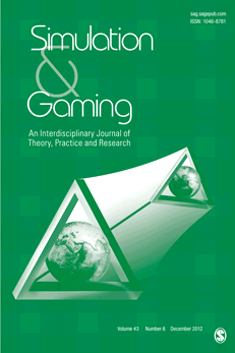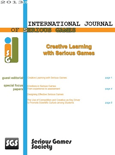
Games for Health Journal
Scope & Guideline
Transforming health outcomes with digital gameplay.
Introduction
Aims and Scopes
- Health Promotion through Gaming:
Research on how games can motivate users to adopt healthier lifestyles, including physical activity and mental wellness. - Rehabilitation and Therapy:
Studies that evaluate the effectiveness of game-based interventions in rehabilitation settings, particularly for patients recovering from injuries or managing chronic conditions. - Cognitive and Emotional Health:
Exploration of the impact of games on cognitive functions, mental health issues, and emotional regulation in various populations, including children, the elderly, and those with disabilities. - Technological Innovations in Gaming:
Investigations into the use of advanced technologies, such as virtual reality and augmented reality, to enhance the therapeutic effects of games. - Social Interaction and Engagement:
Examination of how games can foster social connections and community engagement, especially among vulnerable populations like the elderly or those with disabilities.
Trending and Emerging
- Virtual Reality Applications:
An increasing number of studies are exploring the use of virtual reality (VR) for therapeutic interventions, indicating its growing importance in rehabilitation and mental health treatment. - Gamification in Healthcare:
Research on the application of gamification techniques in healthcare settings is on the rise, showcasing how game design elements can enhance patient engagement and motivation. - Exergaming for Physical Health:
The trend toward exergaming—combining physical exercise with gaming—has gained traction, especially in promoting physical activity among various age groups and populations. - Mental Health Gaming Interventions:
There is a notable increase in the exploration of games specifically designed to address mental health issues, reflecting a growing recognition of their potential therapeutic benefits. - Community and Social Games:
Emerging studies are focusing on games that promote social interaction and community building, particularly among the elderly and marginalized groups, indicating a shift towards addressing social well-being through gaming.
Declining or Waning
- Traditional Gaming Interventions:
There appears to be a decline in studies focusing solely on traditional gaming methods without incorporating innovative technologies such as VR or AR, as newer methods are favored for their enhanced engagement and effectiveness. - Non-Interactive Digital Games:
Research on non-interactive digital games has waned, possibly due to a shift toward more interactive and immersive experiences that better engage users in health-related behaviors. - Generalized Health Games:
The focus has shifted from generalized health games to more targeted interventions addressing specific health issues, indicating a move toward precision in health gaming research.
Similar Journals

PHYSICAL & OCCUPATIONAL THERAPY IN GERIATRICS
Elevating standards in physical and occupational therapy for seniors.PHYSICAL & OCCUPATIONAL THERAPY IN GERIATRICS, published by Routledge Journals, Taylor & Francis Ltd, is a vital resource in the field of aging, dedicated to advancing knowledge and improving practices in physical and occupational therapy specifically tailored for the geriatric population. With an ISSN of 0270-3181 and E-ISSN of 1541-3152, this journal has been pivotal since its inception in 1981, providing a platform for scholars and practitioners to share innovative research and insights. Although currently listed in the Q4 quartile for Geriatrics and Gerontology and performing respectively in other categories, its ongoing commitment to research excellence and dissemination of evidence-based practices aligns with the increasing significance of rehabilitative care in an aging society. The journal contributes to understanding critical aspects of geriatric care, addressing the multifaceted challenges faced by health professionals in occupational and physical therapy. Researchers, professionals, and students in the field will find a wealth of knowledge that not only informs their practice but also fosters improved health outcomes for older adults. This journal is a crucial link between theory and practice, striving to illuminate the pathway for better rehabilitation paradigms in geriatric therapy.

Cyberpsychology Behavior and Social Networking
Exploring the Digital MindscapeCyberpsychology Behavior and Social Networking is a leading international journal dedicated to the exploration of the intricate relationship between psychology and digital interactions. Published by Mary Ann Liebert, Inc, this esteemed journal boasts a strong impact factor, reflecting its significance in the fields of psychology, communication, and computer science. With a broad scope encompassing topics such as social networking, online behavior, and human-computer interaction, the journal aims to provide a vital platform for researchers, professionals, and students to share innovative research and insights. Recognized as a Q1 journal across multiple categories, including Applied Psychology and Human-Computer Interaction, it ranks impressively among its peers, underscoring its influence in advancing academic discourse. Additionally, the journal offers open access options, enhancing the visibility and accessibility of published work to a diverse audience. As digital technologies continue to evolve, Cyberpsychology Behavior and Social Networking remains at the forefront, fostering scholarly dialogue that navigates the psychological ramifications of our increasingly interconnected digital lives.

PSYCHOLOGY OF SPORT AND EXERCISE
Transforming Exercise Through Psychological UnderstandingPsychology of Sport and Exercise, published by Elsevier, is a leading academic journal in the fields of applied psychology and sports science. With its ISSN 1469-0292 and E-ISSN 1878-5476, the journal has established a strong foothold in the Netherlands, specifically from its address at RADARWEG 29, 1043 NX AMSTERDAM. The journal is recognized for its high impact, currently holding a Q2 ranking in Applied Psychology and a prestigious Q1 ranking in Sports Science as of 2023. It is positioned in the 74th percentile among applied psychology journals per Scopus rankings, demonstrating its influence and relevance in current research. Aimed at researchers, professionals, and students alike, the journal offers a comprehensive platform for the dissemination of innovative research findings, theoretical discussions, and practical applications related to the psychological aspects of sports participation and physical activity. By focusing on the intersection of psychological principles and exercise behaviors, Psychology of Sport and Exercise plays a crucial role in advancing our understanding of how mental processes influence physical performance, making it an invaluable resource for those dedicated to enhancing well-being through sport and exercise.

Cyberpsychology-Journal of Psychosocial Research on Cyberspace
Navigating the Complexities of Online InteractionsCyberpsychology - Journal of Psychosocial Research on Cyberspace, published by Masaryk University, Faculty of Social Studies, is a pioneering open-access journal dedicated to the rapidly evolving field of cyberpsychology, exploring the intricate relationship between technology and human behavior. Since its inception in 2007, this journal has provided a vital platform for researchers and practitioners to disseminate findings on how cyberspace influences social interactions, mental health, and identity formation. With an impressive Q1 ranking in Communication and a strong presence in related fields, including Psychology and Social Sciences, the journal garners significant attention, reflected in its high rankings in Scopus. The open-access model ensures that groundbreaking research is freely accessible, promoting widespread engagement within the academic community. Located in the heart of the Czech Republic, it aims to foster interdisciplinary discussions and encourage critical research that addresses the psychosocial challenges in our increasingly digital world. Researchers, students, and professionals alike are invited to contribute to and benefit from the diverse and dynamic discourse facilitated by this esteemed journal.

Journal of Human Sport and Exercise
Championing open access for groundbreaking health research.The Journal of Human Sport and Exercise is a premier open access journal published by UNIV ALICANTE since 2006, providing a vital platform for the dissemination of cutting-edge research in the fields of Physical Therapy, Sports Therapy, Rehabilitation, and Sports Science. With its ISSN 1988-5202 and E-ISSN 1988-5202, the journal promotes high-quality research that drives advancements in human performance and well-being. The journal has an impact factor indicative of its contributions, currently categorized in Q3 for Physical Therapy, Sports Therapy, and Rehabilitation, alongside Q4 in Sports Science as of 2023. It holds a Scopus rank of #133 out of 247 in the Health Professions category, reflecting its commitment to academic excellence. With converged years from 2010 to 2024, it aims to foster a collaborative environment for researchers, professionals, and students alike, seeking to explore the intersections of sports, health, and exercise. Based in Spain, the journal's open access policy ensures that valuable research is freely available, amplifying its reach and impact across the global academic community.

International Journal of Gaming and Computer-Mediated Simulations
Exploring the Frontiers of Gaming InnovationThe International Journal of Gaming and Computer-Mediated Simulations, published by IGI Global, serves as a pivotal platform for the dissemination of cutting-edge research in the realms of gaming and computer-mediated interactions. Established in 2009, it has consistently provided a scholarly space for innovative discussions around the implications, advancements, and societal impacts of gaming technologies and simulations. With an impressive impact factor as it continues to grow within the Q3 category of Computer Science Applications, this journal ranks #491 out of 817 in Scopus, highlighting its significance within an evolving discipline. Featuring contributions from both established and emerging scholars, the journal aims to bridge theoretical knowledge and practical application, thereby nourishing the academic pursuits of researchers, practitioners, and students alike. Access to the journal's rich content is critical for those striving to keep pace in this dynamic field, making it an essential resource for anyone invested in the future of gaming and computer-mediated environments.

SIMULATION & GAMING
Innovating Research in Simulation and Gaming DynamicsSIMULATION & GAMING, published by SAGE PUBLICATIONS INC, is a leading academic journal that explores the intersection of simulation and gaming within diverse fields such as business, social sciences, and computer science. With an ISSN of 1046-8781 and an E-ISSN of 1552-826X, this journal stands out in its commitment to advancing knowledge through high-quality research and innovative methodologies. As a testament to its influence, it is ranked Q1 in Social Sciences and Q2 in both Business, Management and Accounting, and Computer Science Applications, indicating its reputable position among scholars. Researchers, educators, and professionals will find valuable insights into the applications and implications of simulation and gaming, making it an essential resource for cutting-edge developments in these rapidly evolving domains. Access to its comprehensive archives allows for exploration of pivotal studies dating back to 1970, supporting the ongoing dialogue in this interdisciplinary area of research.

International Journal of Serious Games
Championing Open Access to Game-Changing ResearchThe International Journal of Serious Games is a pioneering publication dedicated to advancing the interdisciplinary field of serious games and their application in various domains such as education, artificial intelligence, and human-computer interaction. Published by SERIOUS GAMES SOC in Italy, this Open Access journal has been facilitating unrestricted access to innovative research since 2014. The journal is recognized for its quality, achieving prominent rankings in its categories, including Q2 in Education and Q2 in Computer Graphics and Computer-Aided Design as of 2023. With its commitment to academic rigor, it places itself as an essential resource for researchers, professionals, and students seeking to explore the transformative potential of serious games. Housed at the IST INT COMUNICAZIONI, VILLA PIAGGIO, GENOA, the journal continues to foster knowledge sharing and collaboration across disciplines, enriching the global discourse on gaming for impact.

Multimodal Technologies and Interaction
Exploring the Future of User Experience.Multimodal Technologies and Interaction, published by MDPI since 2017, is an esteemed open-access journal based in Switzerland, dedicated to the exploration and advancement of innovative multimodal systems that enhance user experience across various digital platforms. With its commitment to disseminating high-quality research in diverse areas such as Computer Networks and Communications, Human-Computer Interaction, and Neuroscience, the journal has rapidly established itself within the academic community, achieving a commendable position in Scopus rankings including Q2 in both Computer Networks and Communications and Computer Science Applications. As an essential resource for researchers, professionals, and students alike, Multimodal Technologies and Interaction fosters interdisciplinary dialogue and supports the development of cutting-edge technologies, ensuring that advancements in multimodal interaction are accessible to a global audience. Scholars can benefit from its Open Access format, allowing unrestricted access to influential studies that shape the future of technology and interaction design.

Annual Review of CyberTherapy and Telemedicine
Unveiling Insights in Remote Therapy and MedicineAnnual Review of CyberTherapy and Telemedicine, published by the Interactive Media Institute, serves as a premier platform for advancing knowledge and research within the dynamic fields of cybertherapy and telemedicine. This Open Access journal, operational since 2003, is based in Belgium and has seen a convergence of contributions from 2009 to 2023. With a focus on interdisciplinary applications, the journal spans crucial areas such as computer science, neuroscience, psychology, and rehabilitation, showcasing diverse studies that impact clinical practices and patient outcomes. Despite its current Q4 quartile rankings in multiple categories, the journal aims to enhance its visibility and impact within these emerging fields, catering to researchers, practitioners, and students eager to explore advancements in therapy and remote patient care.